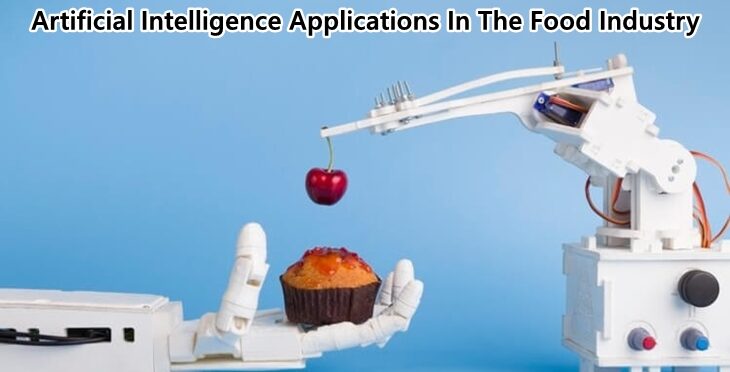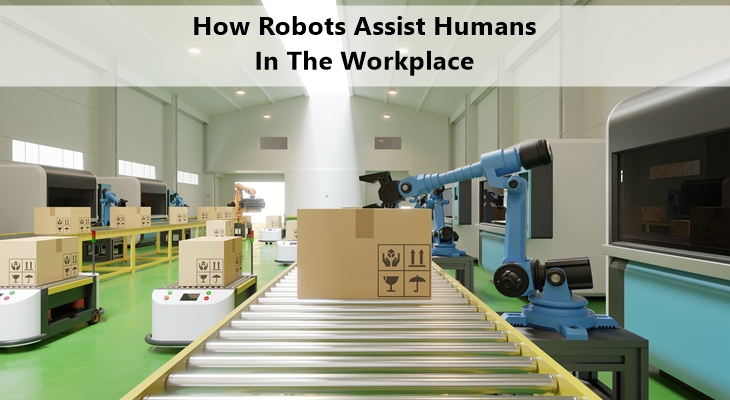What is Artificial Intelligence
Artificial Intelligence is an area of computer science. It demonstrates or models human intelligence in machines. It is also a process for making machines think intelligently.
AI is developed by studying human behavior and thinking processes. It takes note of how people learn, make decisions, and collaborate when solving a problem. The findings of these numerous investigations serve as a foundation. It is then used for the development of associated intelligent software and systems.
Artificial Intelligence in Food Industry
Artificial Intelligence will play a critical role in food production in the future. Companies in the food and beverage industry are rapidly using technology. The aim is to improve operational and logistical efficiencies and meet customer demands. To retain great empathy with their audience, the industry's leading players have embraced Artificial Intelligence.
For many sectors, Artificial Intelligence and Machine Learning technologies offer several opportunities. AI helps to streamline and automate processes, save money, and eliminate human error. Restaurants, bars, cafes, and food manufacturers, can profit from AI and machine learning. These two divisions offer a lot of frequent application cases for AI in the food industry.
Applications of Artificial Intelligence in the Food Industry
Food processing is a challenging industry. It includes sorting food or raw materials from the farm and maintaining machines and various sorts of equipment. Finally, when the final product is ready to ship, it is inspected for quality and determined whether it is ready to send. However, AI automates this procedure in many food processing facilities.
The top 5 Artificial Intelligence applications are listed below. These directly impact food processing firms. These processes help companies generate revenue and improve customer experience.
Sorting Packages and Products
The sorting of feedstock is the first operational difficulty that food processing companies encounter. Every potato, tomato, orange, and apple is unique, necessitating meticulous sorting. Every food processing company must maintain a particular level of quality to be competitive. This procedure involves a lot of human effort if it isn't automated with AI and other new technologies like IoT.
According to TOMRA, humans sorted 90% of the food until the end of the twentieth century. TOMRA is a major sorting and collection software solutions provider. It is situated in Norway. TOMRA uses X-ray, NIR (Near Infrared) spectroscopy, LASER, cameras. It combines this tech with a unique machine-learning algorithm. This algorithm examines numerous features of a fruit or vegetable for sorting. It is different from the existing food sorting robots that only sort imperfect quality fruits and vegetables from the good ones.
A Japanese food processing firm, Kewpie Corporation, developed an AI-based machine. It detects irregularities in agricultural produce. Corporations such as TORMA and Kewpie are assisting the food processing industries. Thus helping in increasing their revenue while also improving yields.
Food Safety Compliance
In the food processing industry, safety is a significant problem. Even the tiniest contamination in food can be fatal. Factories have begun to use AI-based cameras to identify whether or not an employee dresses appropriately. It is, however, a large-scale application of what the Shanghai municipal health agency did in Shanghai restaurants. The agency has installed AI-enabled cameras in more than 200 eateries. In conjunction with Remark Holding, it plans to expand to more than 2000 outlets.
The AI-enabled cameras assist restaurant management in keeping an eye on their employees. This is to see if they are wearing suitable food protection gear following food safety rules. It also aids them in detecting any form of indiscipline in real-time.
Maintaining Cleanliness
Cleanliness is a significant problem in food processing plants. Many businesses claim to be clean since all of their processes are automated and unaffected by human intervention. What happens if the machines and equipment become contaminated? Customers have also evolved, and they understand that just because a procedure is automated does not mean the product is safe to eat.
The University of Nottingham found that equipment cleaning consumes over 30% of a food processing plant's energy and water. They estimate that their AI-based sensor system can save almost $133 million per year. This will also reduce cleaning time by 50%. It will also reduce electricity and water use.
Traditional cleaning systems lacked sensors. This resulted in the presence of food particles in equipment vessels. The old system couldn't clear minute food particles, but the new self-optimizing cleaning system could. It delivers data to the Machine Learning algorithm. To do this, it uses optical fluorescence imaging and ultrasonic sensing technologies. This will also aid in the monitoring of microbiological waste and food particles in the equipment.
Developing Products
The food processing sector is unique in that a single company can produce a wide range of products. Coca-Cola, for example, has purchased over 500 brands and offers over 3500 different drinks to its clients. However, the question of how the corporation chooses which flavor to make next arises. Prior to AI, the company performed surveys and advertising to learn about their consumers' preferences.
Coca-Cola currently maintains a number of self-serving soda fountains. These soda fountains allow consumers to build their own customized drink by mixing a selection of Coca-Cola liquids. Thousands of these fountains were installed around the United States. Hundreds of consumers created their own beverages at each of these fountains. They also investigated using artificial intelligence. It was discovered that the majority of customers blend cherry-flavored Coke with Sprite. Coca-Cola used this information to develop Cherry Sprite, a new product.
Assisting Customers With Decision Making
AI, like food processing firms, aids customers in making more intelligent purchasing decisions. Kellogg's is the world's largest food company. It debuted Bear Naked Custom, which allowed customers to make their own unique granola using more than 50 ingredients. The system made use of IBM's Chef Watson. Chef Watson stores hundreds of possible recipes. These recipes are then fed into an AI algorithm. This helped users figure out if the items would work well together.
This technology assisted customers in creating little personalized quantities of granola. It also helped the corporation in determining what their next line of product should be, comparable to Coca-Cola.
Conclusion
Despite its infancy, artificial intelligence is transforming the food processing and handling industry. It will completely transform the Food Processing & Handling sector in the following years. AI will also assist these businesses in increasing revenue by speeding up the manufacturing process. AI will help in reducing maintenance time and thus reduce production downtime. It will also lower the risk of failure by automating almost every operation. AI will also play a significant role in providing an excellent customer experience by anticipating their likes, dislikes, and desires.
You make like to read:
Machine Learning Trends in Data Analytics and Artificial Intelligence
Artificial Intelligence in Advertising: Examples & Applications
Challenges Faced By Human-Machine Collaboration






